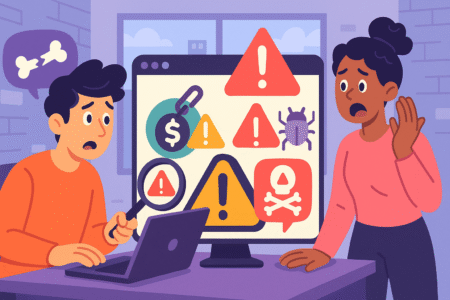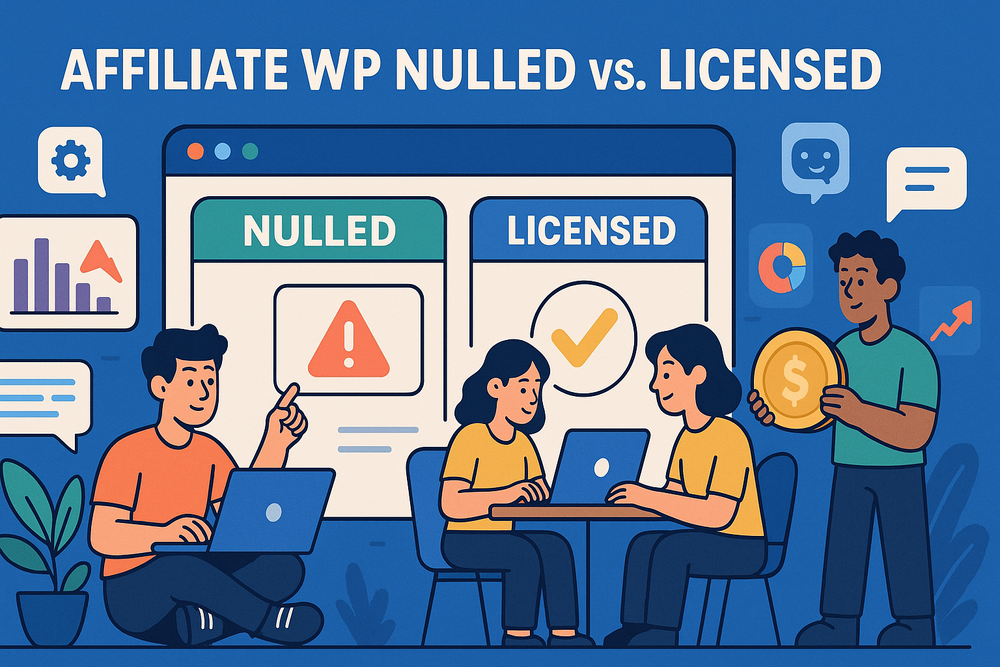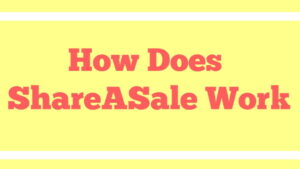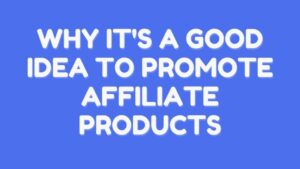Table of Contents
Choosing between a nulled and a licensed version of AffiliateWP can be tricky. On the surface, the cost savings may seem appealing, but there’s a lot to unpack underneath. This guide explores both sides with clarity, honesty, and practical advice.
Understand What Affiliate WP Nulled Really Means
Before deciding between a nulled or licensed version, it’s important to understand what “affiliate wp nulled” actually refers to—and what you’re signing up for if you go that route.
What Does “Nulled” Actually Mean?
A nulled plugin is a modified version of a premium WordPress plugin that has been stripped of its licensing code and redistributed for free. In the case of Affiliate WP nulled, it means someone took the original plugin, removed the code that checks for a valid license, and put it online for anyone to download without paying.
At first glance, it might look like a good deal—you’re getting the same plugin without the cost. But what often gets overlooked is that you’re also missing out on everything that makes the original version trustworthy: updates, security patches, support, and stability.
Who Distributes Nulled Plugins—and Why?
There are entire websites that specialize in distributing nulled WordPress products. Some make money by placing ads on the site, others use the plugin files as a way to inject malicious code or backdoors into your site. The risk isn’t just hypothetical—it’s well documented. According to Sucuri, a leading website security firm, a significant portion of infected WordPress sites are compromised through pirated plugins.
People who distribute these versions often say they’re doing it in the name of “freedom” or “open access,” but when you peel back the layers, the motives are rarely that pure.
The Illusion of “Free” Comes With Hidden Costs
When you download Affiliate WP nulled, you might save money upfront—but it comes at a cost:
- No automatic updates, which leaves your site vulnerable to bugs or exploits.
- No official support when something breaks.
- High risk of malware or spam injections hidden in the code.
- Compatibility issues with future WordPress or plugin updates.
The “free” version isn’t really free when it can cost you your traffic, your leads, or even your entire website.
Real-World Example: A Costly Shortcut
I once spoke with a freelancer who used a nulled version of Affiliate WP on a client’s site to cut corners. Three weeks in, the site started redirecting visitors to spammy landing pages. It took hours of cleanup, and in the end, the client lost trust—and the freelancer lost the contract. That $200 plugin license they tried to avoid? It ended up costing them much more.
How to Spot a Nulled Version
If you’re unsure whether you’re downloading a nulled version, here are a few red flags:
- The plugin is offered for free on third-party websites not affiliated with the official developer.
- There are no guarantees, support forums, or documentation.
- The plugin asks for unusual file permissions or behaves unpredictably.
When in doubt, go to the source. Affiliate WP’s official website is the only place you can get a legitimate, secure version with ongoing support.
Key Takeaway: Downloading a nulled version of Affiliate WP might seem like a clever workaround, but it opens the door to security threats, bugs, and serious ethical concerns. If you’re building a business or taking affiliate marketing seriously, relying on pirated software is a shaky foundation.
Compare Core Features: Nulled vs. Licensed Versions

Understanding the real difference between the features of Affiliate WP nulled and its licensed counterpart can help you make a smarter, long-term choice.
What You Actually Get With the Licensed Version
When you buy a license for Affiliate WP, you’re getting more than just the core plugin. You unlock a suite of features and services designed to make your affiliate program stronger, safer, and more scalable. Some of the standout licensed features include:
- Regular updates that ensure compatibility with the latest WordPress versions.
- Priority support from a team that actually built the plugin.
- Pro add-ons like recurring referrals, lifetime commissions, tiered affiliate rates, and custom affiliate registration.
- Seamless integrations with popular tools like WooCommerce, Easy Digital Downloads, MemberPress, and more.
- Automatic bug fixes and security patches that prevent vulnerabilities before they become real problems.
And maybe most importantly, you’re investing in a sustainable product. Supporting the developers means you can expect long-term improvements, better features, and new integrations down the line.
What You’re Missing With Affiliate WP Nulled
Here’s what typically happens when you use the nulled version:
- Feature Gaps: Many nulled versions are outdated and missing newer features or add-ons that come with an active license.
- No Updates: Once WordPress or another plugin updates, you’re stuck with a version that might not work anymore.
- Zero Support: If you run into an issue, you’re completely on your own.
- Security Risks: Because the plugin code has been tampered with, you can’t be sure it’s safe.
- Incompatibility Issues: Over time, your site may start to break as plugins clash or core WordPress functionality evolves.
It’s like driving a car without insurance—sure, it works for a while, but the second something goes wrong, you’re left holding the bill.
Real Feature Comparison: Side-by-Side
| Feature | Affiliate WP Licensed | Affiliate WP Nulled |
| Automatic Updates | Yes | No |
| Pro Add-ons | Yes (with Professional) | Often missing or broken |
| Developer Support | Yes | None |
| Security and Bug Fixes | Guaranteed | Risky or outdated |
| Legal to Use for Business | Yes | No |
| WordPress Compatibility | Maintained with updates | Degrades over time |
The Long-Term View: Peace of Mind Matters
From what I’ve seen, most people who choose the licensed route aren’t just paying for features—they’re paying for peace of mind. When your website is your livelihood, being able to rely on tools that are stable, secure, and supported makes a massive difference.
And if you’re running an affiliate program for your own digital products, clients, or services, a stable plugin is the difference between gaining recurring commissions and losing affiliate trust.
Cost Breakdown: Nulled vs. Licensed
Understanding the real cost difference between using Affiliate WP nulled and buying a licensed version isn’t just about dollars—it’s about value, risk, and long-term sustainability.
The Hidden and Indirect Costs of Nulled Plugins
On the surface, affiliate WP nulled looks like a budget-friendly choice. It’s free, fast to install, and often marketed as “just as good” as the original. But those surface-level savings hide deeper costs that often don’t show up until it’s too late.
Security Vulnerabilities That Can Cost Thousands
Nulled plugins are often altered to bypass license checks, which leaves them open to hidden backdoors, malware injections, and unauthorized scripts. According to Wordfence, more than 60% of WordPress hacks stem from insecure plugins and themes. With affiliate marketing, where commissions and leads are involved, this risk goes even deeper—sensitive data, referral tracking, and user trust are all at stake.
Even if you detect the breach, cleaning it up can cost anywhere from $100 to over $1,000 with security services like Sucuri or MalCare. And that’s not counting lost revenue or damaged SEO from Google flagging your site.
No Updates = Broken Compatibility Over Time
WordPress core updates happen regularly, and so do updates to themes and other plugins. Without a license, you lose access to those vital plugin updates. Eventually, things stop working: the dashboard breaks, tracking fails, or conflicts crash your site.
I’ve seen sites go from stable to unusable just because one outdated plugin couldn’t keep up. The worst part? There’s no one to call when that happens.
Lack of Support Leads to DIY Headaches
Nulled versions come with zero support. If something goes wrong—and it usually does—you’re left scouring forums or paying a freelancer to fix problems that official support could have solved in minutes.
Whether you’re tech-savvy or not, your time is better spent growing your affiliate business—not debugging broken features caused by unlicensed tools.
What You Really Get for the License Price
Let’s talk numbers. Affiliate WP offers multiple license tiers, but the standard Professional plan is $299 per year. That price covers updates, support, and access to all pro add-ons. At first glance, it may seem steep. But it’s actually one of the more affordable investments in the affiliate space.
You’re Buying Stability, Not Just Software
That $299 isn’t just for a download link. It includes:
- Reliable updates every time WordPress rolls out changes
- Priority email support from developers who understand the plugin inside and out
- Compatibility with top tools like WooCommerce, Stripe, MemberPress, and others
- Add-ons like recurring referrals, custom commissions, and advanced reports
- Peace of mind knowing your affiliate program runs smoothly
When you break that down, you’re paying less than $1/day for a system that tracks, reports, and automates a key part of your income.
Real Return on Investment
Let’s say you earn just $50/month in commissions using Affiliate WP. That’s $600 a year. If the plugin costs $299, you’re already making a profit—and that’s on the low end. Most users report earning significantly more once they optimize their programs using licensed features.
If you’re scaling a store, coaching program, or digital product, affiliate revenue isn’t a “nice to have”—it’s a multiplier. A licensed plugin keeps that multiplier intact.
Bonus Perks That Save Time and Money
Licensed users also gain access to documentation, support articles, and even direct guidance for setting up complex systems. That’s hours saved that would otherwise go into trial and error. In many cases, skipping just one development hiccup more than pays for the license.
Long-Term Costs: Time, Security, SEO, and Growth
Beyond the dollars you see upfront, there are costs that hit harder over time when using affiliate WP nulled. These costs tend to compound, making it harder to grow, maintain credibility, or even keep your site online.
Time Wasted on Debugging and Cleanup
Time is money—especially when you’re running a business. With nulled software, unexpected bugs become part of your routine. You’ll likely spend hours fixing things, or worse, hiring outside help. The cost? Lost productivity, delayed campaigns, and missed affiliate payouts.
SEO Penalties Can Cripple Organic Growth
Google isn’t shy about penalizing sites with malicious scripts. Nulled plugins often contain hidden redirects, spam links, or low-quality code that lowers your page speed. These all hurt SEO. Once your domain is flagged or de-indexed, regaining your rankings takes serious work—or in some cases, a rebrand.
That free plugin might end up costing you years of organic search effort.
Compromised Data Affects User Trust
If your affiliate platform is hacked due to a vulnerable nulled plugin, your affiliate partners—and users—may never trust you again. Whether it’s an exposed referral ID or compromised login, one slip can snowball into refunds, lost partnerships, or even legal action if user data is involved.
Once that trust is gone, rebuilding it is often more expensive than preventing the breach in the first place.
Opportunity Costs: Support, Growth, and Integrations
There’s one more type of cost we often overlook—opportunity cost. Every time you choose a workaround instead of a proper tool, you’re limiting your future options.
No Access to Growth-Focused Features
Licensed Affiliate WP users get tools designed to scale their programs: tiered commissions, payout integrations, advanced affiliate dashboards, and detailed reporting. These aren’t extras—they’re what allow you to build a real affiliate business.
With the nulled version, you’re stuck with the basics (if it works at all). That means slower growth, fewer partners, and limited data to make strategic decisions.
Missed Integrations With Major Platforms
One of the best parts of Affiliate WP is how easily it integrates with other tools. From WooCommerce to Gravity Forms to LearnDash, these connections save time and open doors. But many of those integrations are pro-only.
Without them, you’re doing more manual work—or worse, relying on plugins that don’t talk to each other, leading to more bugs and data mismatches.
Support Saves You from Avoidable Setbacks
Support is often the unsung hero of licensed software. Having a direct line to someone who knows the plugin inside and out means faster fixes, smarter setups, and fewer headaches. For affiliate marketers juggling multiple moving parts, that’s worth far more than the cost of the license.
I’ve seen businesses get stuck for weeks trying to troubleshoot a referral error—only to find out it was something support could have resolved in five minutes.
Uncover Hidden Risks of Using Affiliate WP Nulled

It’s easy to think, “If it works and it’s free, why not use it?” But the risks hidden inside affiliate WP nulled plugins go far beyond a missing update or broken feature. They can quietly chip away at the security, performance, and credibility of your entire business.
Security Threats Lurking in the Code
The most immediate danger of using a nulled plugin is that you don’t know what’s really inside it. The original code has been altered—and often that change isn’t just about removing the license check.
Hackers frequently inject malware, backdoors, or spam links into these plugins. They may not trigger alarms right away, but over time they can:
- Leak sensitive affiliate data or user information
- Open unauthorized access points for attackers
- Create hidden redirects to spammy or malicious sites
- Add invisible links that hurt your SEO
A study from Wordfence found that 23% of hacked WordPress sites were compromised due to pirated plugins. If your site is storing affiliate data, customer referrals, or leads, a single breach could undo months of work.
Breakdowns in Site Performance and Functionality
Since nulled plugins aren’t kept up to date, they often fall behind as WordPress itself evolves. Eventually, this causes conflicts with other plugins, themes, or even core features of your site.
What starts as a small bug—like a referral not tracking—can turn into something bigger, such as:
- Affiliate forms not loading properly
- Dashboard data disappearing or displaying inaccurately
- Broken checkout tracking or payment issues
- Entire affiliate programs going offline during a campaign
I’ve seen websites experience full outages during product launches because of outdated plugins. And when every lead counts, even a few hours of downtime can hurt your income and reputation.
SEO Damage from Hidden Spam and Redirects
Search engines are quick to spot unusual behavior, especially when it’s linked to malware or spammy content. Nulled plugins sometimes include hidden outbound links, code obfuscation, or scripts that redirect users to unrelated third-party pages.
When Google detects this, it might:
- Display warnings like “This site may be hacked” in search results
- Lower your ranking due to link manipulation or suspicious activity
- Remove your pages from the index until the site is cleaned
Recovering from a Google penalty can take months, and in some cases, the domain’s reputation is never fully restored.
Loss of Control Over Site Integrity
When you use affiliate WP nulled, you give up control without realizing it. Any line of malicious code in a pirated plugin can be remotely triggered, meaning your site could be exploited at any time without notice.
And since you don’t have access to support or changelogs, you won’t even know where to start if something does go wrong. That’s a huge risk—especially if your site supports clients, users, or partners.
Real-World Risks: Not Just Theoretical
Here’s a simple example: a blogger downloaded a nulled version of Affiliate WP to track referrals for a new digital course. Everything looked fine—until visitors began reporting strange pop-ups and redirects. By the time the site owner caught it, their email list had been scraped, affiliate links were hijacked, and trust with their partners had taken a serious hit.
That “free” plugin ended up costing them a full rebrand and six months of rebuilding.
Evaluate Legal and Ethical Considerations Honestly
Beyond the technical dangers, using nulled software comes with a set of legal and ethical questions. If you’re building something real and hoping others will trust or partner with you, how you approach this decision matters.
The Legal Grey Area (And Why It’s Not Always Grey)
Some argue that since WordPress is open source, using a nulled plugin is legal. But that’s not quite the full picture. While the GPL license allows redistribution of WordPress-based code, it does not protect you from breaking laws tied to:
- Software modification with malicious intent
- Infringement of trademark or copyrighted branding
- Distributing code that violates terms of service agreements
Affiliate WP may be GPL-compatible, but their brand, support, and premium resources are not. Using a nulled version may technically skate by GPL rules, but it can still leave you legally vulnerable—especially if you redistribute it or use it on client sites.
If something goes wrong (a data breach, for example), you won’t be able to claim you used an approved, supported tool. That lack of legal cover could backfire hard in a dispute.
Building on a Foundation of Trust
If your entire business model revolves around relationships—affiliate partners, customers, clients—then trust is your greatest asset. Using pirated software sends the wrong message, even if no one finds out right away.
Ask yourself: Would you promote a brand that cuts corners or uses unlicensed software? Would your affiliates feel comfortable sending traffic to a site built on something legally questionable?
Being transparent and ethical in how you build your platform builds long-term credibility. It tells your partners, “I’m invested in doing this the right way.”
Ethical Reflections: Would You Want It Done to You?
Put yourself in the developer’s shoes. They’ve built and maintained a powerful plugin like Affiliate WP to help others run better affiliate programs. They offer support, updates, and education—all of which costs time and money to create.
Using a nulled version while benefiting from all that work is like eating at a restaurant, enjoying the meal, and walking out without paying. Sure, you got fed—but you also took something that wasn’t free to make.
If you rely on affiliate marketing yourself, you already believe in the value of fair commissions and rewarding creators. That same principle applies here too.
Respecting the Ecosystem That Supports You
Every plugin, tool, and developer you rely on exists in a broader ecosystem. When you use and support legitimate software, you help that ecosystem grow and improve.
That means better tools, more integrations, and a thriving market of creators. But when users take shortcuts with pirated versions, it weakens the whole system—and slows down innovation for everyone.
Being part of a sustainable community often means making the less convenient choice upfront. But in the long run, it’s what keeps the ecosystem strong and your own business growing.
There’s Always a Cost—Even If It’s Not Immediate
Maybe no one will ever find out you used affiliate WP nulled. Maybe it’ll even work for a while. But there’s a personal cost to building on shaky ground. If you’re serious about your business, wouldn’t you rather know you’re building it the right way—without cutting corners?
Even if the decision feels small, it says something about the kind of creator or entrepreneur you want to be.
Alternatives If You’re On a Tight Budget

If you’re tempted by affiliate WP nulled versions because you’re working with limited funds, you’re not alone. But there are smarter ways to stretch your budget without putting your site—or your business—at risk.
Look for Free Affiliate Plugins With Essential Features
There are several legitimate, free affiliate marketing plugins that offer core tracking and management features. While they might not be as feature-rich as premium options, they’re safe, stable, and legally sound.
A few worth exploring:
- Affiliates by itthinx: Offers basic referral tracking, simple affiliate registration, and shortcodes. It’s perfect for those just getting started.
- SliceWP (free version): Provides affiliate dashboards, referral tracking, and basic payout options. Paid upgrades are available later.
- Affiliate Manager: This plugin works well with WooCommerce and lets you track clicks, referrals, and commissions. While its design is simpler, it’s a solid choice for beginners.
Each of these plugins offers a clean starting point without compromising your site’s safety or reputation.
Consider Lite or Starter Plans From Premium Plugins
Most top-tier affiliate plugins offer scaled pricing. If the full-featured license feels out of reach, look for entry-level plans that give you core features at a fraction of the price.
Affiliate WP itself occasionally offers:
- Personal licenses for a lower cost
- Seasonal discounts (especially around Black Friday or Cyber Monday)
- Monthly payment options, if you reach out to their support team
By starting small, you gain legal access, stability, and update support—without diving into the deep end financially.
Use Third-Party Platforms With Built-In Affiliate Tools
If you’re not ready to manage everything from your own site, consider platforms that include affiliate capabilities in their core offerings. These aren’t traditional WordPress plugins, but they offer a workaround when budget is tight.
Some examples:
- Gumroad: If you’re selling digital products, Gumroad includes a basic affiliate program built into the platform. No need to install or manage anything.
- Teachable: If you’re selling online courses, the built-in affiliate system works well for instructors.
- Podia: Offers affiliate marketing tools on its paid plans—often more affordable than hiring developers or buying complex plugins.
These platforms let you validate your offer and test affiliate potential before investing in more advanced tools.
Use Manual Tracking While You Validate Your Offer
In the earliest stages, you might not need full automation. You can start with a simple manual process using spreadsheets, custom coupon codes, and email to track referrals.
Here’s a simple way to do this:
- Assign a unique discount code to each affiliate
- Ask customers where they heard about your product
- Track conversions manually and pay out commissions via PayPal
This approach isn’t scalable long-term, but it helps you get going without risking your site’s integrity by installing affiliate WP nulled or unsafe plugins.
Watch for Limited-Time Deals and Bundles
Websites like AppSumo, DealMirror, and PitchGround often feature WordPress tools, including affiliate marketing plugins, at a heavy discount.
You can also sign up for plugin developers’ newsletters. Many offer subscriber-only deals or discounts for early access to new features. If you’re not in a rush, keeping an eye on these can help you grab a legitimate license at a lower price.
Choose the Best Option for Your Long-Term Growth
When you’re building something meaningful online—whether it’s a blog, store, or service—your affiliate system plays a big role in how far you can scale. Choosing between affiliate WP nulled and a licensed version isn’t just a financial decision. It’s a strategic one.
Think Beyond Today: What Do You Want to Build?
It’s easy to focus on short-term savings when you’re just getting started. But if you’re serious about growth, the choices you make early on can either support or limit your progress later.
Ask yourself:
- Will I need to scale my affiliate program in 6–12 months?
- Do I plan to integrate with ecommerce tools like WooCommerce?
- How important is data accuracy and reporting in my strategy?
- Will I offer incentives, tiers, or recurring commissions?
If the answer to any of those is yes, you’re already thinking like someone who needs a stable, supported platform. That’s where a licensed plugin truly earns its keep.
A Reliable Foundation Grows With You
With a licensed version of Affiliate WP, you’re getting more than access to features. You’re securing peace of mind. The plugin updates itself with every WordPress change. If something goes wrong, you’ve got people who will help you fix it.
And as your site gets more traffic, customers, or partners, you won’t have to scramble to upgrade or migrate systems. The groundwork is already there.
It’s kind of like planting a tree. The best time to do it was yesterday. The second-best time is now.
Risks That Compound Over Time
Affiliate WP nulled might function for a little while, but over time, the cracks start to show.
You’ll run into:
- Compatibility issues with other plugins
- Missing features that slow down your strategy
- Security flaws that can hurt your traffic or reputation
- Zero support when it matters most
Each one might feel manageable in isolation, but together they compound. And every minute spent fixing these problems is a minute you’re not building, growing, or earning.
The Reputation Factor Is Real
Affiliates want to work with brands that look legit. If your dashboard is buggy, commissions don’t track right, or something just feels off, you’ll struggle to earn trust.
By using the official version of Affiliate WP, you send the right signals:
- Your program is serious
- Your tools are up to date
- Their earnings are in safe hands
This matters more than you might expect—especially as you try to attract experienced or influential partners.
Take a Long-Term Mindset With Your Tools
In my experience, the tools you choose often shape your habits. A legit, fully-supported plugin encourages you to explore what’s possible, not just what’s “good enough.” You start experimenting with tiered rewards, custom integrations, advanced reporting—and that opens the door to real growth.
When you’re not worried about whether your plugin will break next week, you’re free to focus on the parts that move your business forward.
Key Takeaway: The choice between affiliate WP nulled and licensed is really about what kind of business you want to build. If you’re in it for the long haul, the licensed version supports your growth, protects your time, and builds the kind of foundation real success is built on. It’s not just a plugin—it’s a commitment to doing things right.
Final Thoughts: Build Smart, Grow Confidently
Choosing between Affiliate WP nulled and the licensed version might seem like a small decision, but it reflects how you approach your entire business. Are you patching things together, or are you building something solid that can grow with you?
You don’t need a huge budget to make the right choice—just clarity and a willingness to invest where it truly counts. Whether you’re starting small or scaling up, having reliable tools makes a difference you’ll feel every single day.
Here’s what you can do next:
- If you’re still unsure, start with a free or lite plugin while you validate your idea.
- If you’re already running affiliate campaigns, consider the licensed version of Affiliate WP as a growth investment.
- If budget is tight, keep an eye out for seasonal discounts or ask about payment options directly.
Whatever route you choose, aim for a setup that brings peace of mind, not problems. Because when your tools work for you, it frees you up to focus on what really matters—growing your business and supporting your community.






